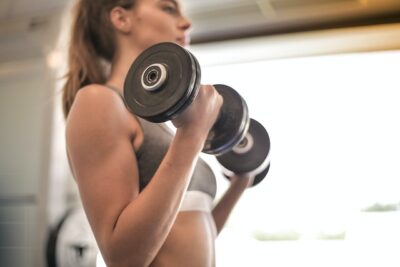Becoming a better athlete requires dedication, discipline, and hard work. Whether you’re a professional athlete or someone who simply wants to be fitter, aiming to become a better athlete can potentially improve your health and confidence while providing more professional opportunities.
This article will cover seven tips to help you achieve your goal. From setting goals and maintaining a healthy diet, these tips will help you optimize your performance and reach your full potential.
Tip 1: Set Clear Goals
Setting clear goals is an essential part of the process toward improved fitness and athleticism. It’s how you decide what you should be working for and how to approach the journey. Here are some tips to help you set and achieve your goals:
- Define Short-Term and Long-Term Goals:
- Be S.M.A.R.T: Make your goals specific, measurable, achievable, relevant, and time-bound (S.M.A.R.T).
- Track Progress and Adjust Goals as Necessary: Keeping track of your progress is both motivating and necessary. It allows you to measure the efficiency of your strategy and training and to reevaluate if needed.
Setting clear goals is the first step to becoming a better athlete, and after that, comes real effort: training.
Tip 2: Develop a Training Plan
A training plan is what influences your athletic ability. It can increase strength, speed, and endurance, among other physical qualities. Here are some tips to help you create a training program:
- Assess Current Strengths and Weaknesses: Determine what areas you need to focus on.
- Design a Well-Rounded Training Program: Create a training program that addresses all areas you want to tackle. Incorporate different exercises to challenge yourself in different ways
- Incorporate Various Exercises: This helps prevent boredom while also providing a more comprehensive workout.
- Consider Cross-Training To Prevent Overuse Injuries: Some examples of cross-training include yoga, swimming, and cycling. They give your body a break from your training.
By developing a well-rounded plan that is challenging and adaptable, you optimize your athletic potential. Even then, training is nothing without a good diet.
Tip 3: Focus On Proper Nutrition
You need to engage in good dietary practices to perform at your peak. Nutrition can be challenging to tackle, however, so here are some tips for you:
- Understand the Importance of Balanced Meals: Consume a balanced diet of around 40 to 60% carbs, 10 to 30% protein, and 20% to 30% healthy fats.
- Consume a Variety of Nutrient-Dense Foods: Incorporate fruits, vegetables, whole grains, lean protein, and fish.
- Stay Hydrated Before, During, and After Workouts: Drink plenty of water to prevent dehydration which can impair athletic performance and risk your health.
- Seek Guidance From a Professional Nutritionist: If you’re unsure about what to eat or have specific needs, seek a nutritionist to help you create a diet plan.
And just like a proper diet, proper rest is important too.
Tip 4: Prioritize Rest and Recovery
Rest is just as important as training for improving athletic performance as it allows your body to repair. Some recommendations include:
- Allow Time for Adequate Sleep: Aim for seven to nine hours of sleep per night to ensure that your body has time to repair and recharge.
- Incorporate Rest Days Into Your Training Schedule: Rest days in between training, especially muscle training, are necessary to allow your body to recover.
- Utilize Active Recovery Techniques: Recovery techniques like stretching and massages help improve blood flow and reduce muscle soreness and fatigue.
- Consider Using Toe Socks for Enhanced Foot Recovery: Toe socks can help promote circulation, reduce blisters, and improve foot alignment.
- Listen to Your Body and Address Any Signs of Overtraining: If you’re experiencing fatigue, muscle soreness, or other signs of overtraining, take a break. Give your body time to repair.
By prioritizing rest and recovery, you improve your health, prevent injuries, and enhance results from training.
Tip 5: Seek Professional Coaching and Guidance
You also have the option to rely on a professional coach to guide you through the journey. Here are some suggestions in case you decide to do so:
- Work with experienced coaches who specialize in your sport.
- Engage in communication, and look for technique instruction and feedback.
- Benefit from structured training programs that are personalized and tailored to your goals and needs.
By seeking professional coaching, you avoid the stress of having to plan everything by yourself. It makes it so engaging, and training can go by much faster too.
But let’s not forget about a very important aspect of the whole journey: having the right mindset.
VII. Tip 6: Cultivate a Positive Mindset
A positive mindset is key to athletic success. Focus on these tips to keep yourself motivated and positive:
- Developing Mental Resilience and Focus: Learning to manage stress and pressure, as well as developing the ability to stay focused and perform under challenging conditions. Deep breathing exercises and meditation are recommended.
- Practicing Visualization and Positive Self-Talk: Visualization involves mentally rehearsing successful performances and positive self-talk involves using positive affirmations to counter negative thoughts.
- Embrace Challenges As Opportunities for Growth: Embracing challenges as opportunities for growth is another important aspect of cultivating a positive mindset. It allows you to see failures as a new way to improve yourself.
- Stay Motivated and Maintain a Love for the Sport: Being in love with what you do is essential for long-term success. Set realistic goals, stay connected to the reasons why you love the sport, and find ways to stay engaged and inspired.
Tip 7: Embrace Continuous Learning
The right mindset is important to both enjoy and benefit from the journey. There’s always something new you can learn. Attending workshops, researching, and learning from other athlete is a great way to keep improving yourself.
Studying new gear and ways to enhance your experience is also crucial. As an athlete, investing in new shoes, apparel, or toe spacers can greatly benefit you. If you’re seeking places to find these items, there are numerous brands available, but one that particularly impressed us in our research is Correct Toes.
Conclusion:
Being an athlete can be daunting, especially if you know nothing about it. With the tips we discussed, you will enhance your athletic prowess and achieve the goal you so fervently want to achieve: being better at your craft.









